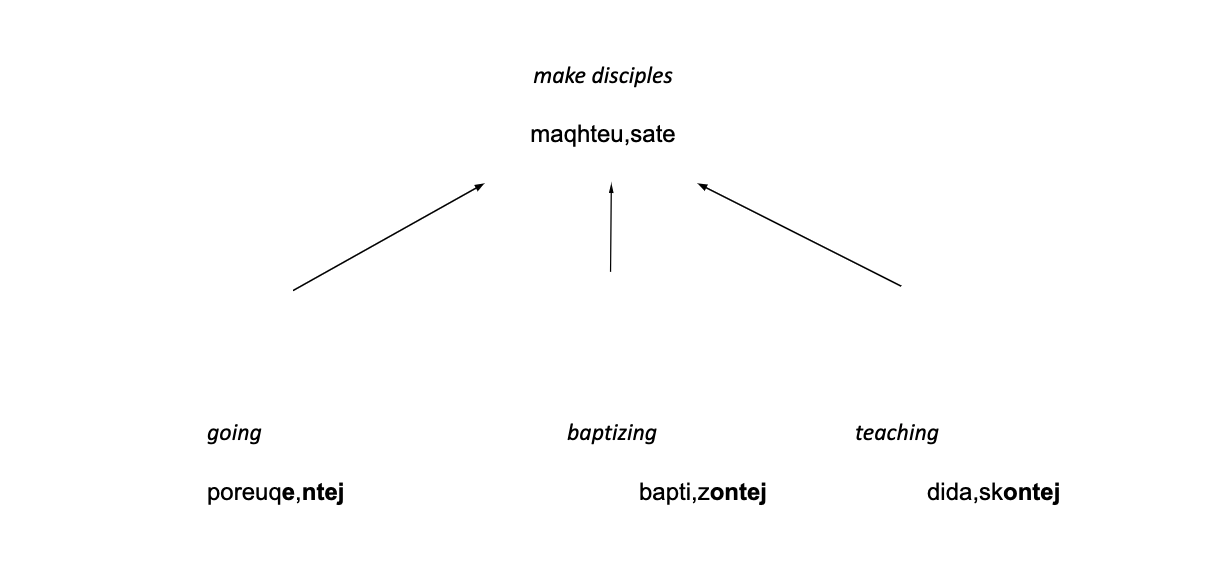"If you don't know where you’re going, any road can take you there." - Lewis Carroll
There is a wonderful Indian parable about a traveler who left Delhi on a business trip to several cities.
He was on trains and in hotels with a colleague who was known to be… well… of poor character. The businessman had money and valuables with him, and he was legitimately concerned about being robbed by his traveling companion.
So, in every hotel room, on every night of the trip, the businessman would go into the restroom to brush his teeth and get ready for bed. He was well aware that his traveling companion would ransack the room looking to find and take his valuables.
This routine continued night after night. Practically tearing the room apart, the unsavory colleague left no stone unturned in his quest for the wealthy man’s treasures.
Finally, at the end of the trip after yet another futile effort, the frustrated would-be thief came clean and told the businessman that each night, he had tried to find his valuables—and failed.
He bluntly asked the businessman where he had hidden them. The wise man’s response? “I hid them in the one place I thought you would never look: under your own pillow.”
Sometimes treasure is closer than we realize, sometimes even right “under our own pillows,” presented to us in the most obvious manner, yet we look everywhere without finding it. Somehow, we don’t see that which is directly in front of us.
So, it is with the Great Commission: its message is right in front of us, but—like the thief in the parable—we miss it.
And, yes, I’ll explain.
The Great Commission

"The eleven disciples went to Galilee, to the mountain where Jesus had told them to go. When they saw him, they worshiped him; but some doubted. Then Jesus came to them and said, 'All authority in heaven and on earth has been given to me. Therefore, go and make disciples of all nations, baptizing them in the name of the Father and of the Son and of the Holy Spirit, and teaching them to obey everything I have commanded you. And surely, I am with you always, to the very end of the age.'" (Matthew 28:16-20)
One of the most well-known passages in the Bible, these verses—known as Jesus’ Great Commission—have for centuries been the scriptural impetus for missionary work, evangelism, and outreach. It is no exaggeration to say that the Great Commission has, for decades, served as the marching orders for evangelical Christianity.
Teachings on this passage have inspired thousands of Christians to leave their homes and move to every corner of the world with the message of the gospel.
This passage has also inspired millions of Christians to befriend their neighbors, invite them to church, walk from door to door, organize meetings in homes and stadiums—all for the purpose of sharing the good news of Jesus crucified and raised from the dead. God has honored the preaching and teaching of this passage and moved mightily through it to bring countless millions to faith in His Son, Jesus Christ.
Enormous churches and massive mission organizations have been birthed and fueled by Matthew 28:16-20. My own journey to faith in Jesus Christ as my Lord and Savior was the fruit of individuals committed to this Great Commission.
When I attended seminary, studied Greek, and heard Ralph Winter teach at the U.S. Center for World Mission, I was struck by the actual meaning of the Matthew 28 text.
Some years later, I read The Great Omission by Dallas Willard and came under similar conviction. Consider this statement from Willard’s introduction to his book:
"Some might be shocked to hear that what the “church”–the disciples gathered–really needs is not more people, more money, better building or programs, more education or more prestige. Christ’s gathered people, the church, has always been at its best when it had little or none of these. All it needs to fulfill Christ’s purposes on earth is the quality of life he makes real in the life of his disciples." (xiv)
Later in the same book, Willard noted how many struggling small-church pastors define success: “It would never be enough so long as his attendance was not large and growing and he did not have an appropriate building and cash flow” (32).
Attendance, Building, Cash—these are the ABC’s of ministry success. I have lived in this reality my entire children’s ministry life. At each and every event I attended as a megachurch children’s pastor, conversation was all about the following:
- How many children attend on an average weekend?
- How many staff members (paid and volunteer) serve in your kids’ ministry?
- How big and how fancy are your facilities?
- What is your budget?
The people with the big numbers were the plenary speakers. I’m not sure this has changed.
Do We Know What the Great Commission Says?

During my years of ministry work with children around the world, I came to realize we were missing something obvious in the Great Commission passage, something that is crucial to boys and girls. Stay with me…
Look back at Matthew 28:18-20. Did you see in those verses any words or phrases like evangelize, make converts, reach people, share the message of salvation, have an altar call, lead in the Sinner’s Prayer, or even preach the gospel?
These ideas are present elsewhere in the New Testament. Though they may be implied in this passage, they are not specifically mentioned.
The Great Commission clearly calls us to make disciples. Yet this completely obvious fact has been ignored, resulting in a misguided focus in ministry.
Compounding the confusion has been the delineation of “evangelism” and “discipleship”. Evangelism being understood as concern for non-Christians and discipleship defined as helping believers become more deeply rooted in their faith or more passionate about living for Christ.
This has effectively divided Christianity with a false dichotomy; those concerned about the lost (evangelism) and those concerned about helping Christians become better Christians (discipleship).
For many the “Great Commission” is about evangelism; getting nonbelievers—again, of whatever age—to say the Sinner’s Prayer and then reassuring them that they will get to heaven. This focus reduces Christianity to God’s rescue system, and this, too, is a misguided priority.
I was actually in a church where the Pastor boldly proclaimed to the congregation that if you are a Christian and want to grow,………find another church. His church was about seeking and saving the lost!
This is not uncommon in mega churches where nearly the entire focus of the Sunday services is on helping “seekers” find Christ and confess Him as LORD and Savior. This is also the nearly sole focus of many parachurch children’s ministry organizations that make child “evangelism” the center of everything that they do.
Whatever merits this approach has, it is not fulfilling the Great Commission.
On the other side of the false dichotomy is the church or parachurch ministry that give nearly exclusive focus to helping Christian children grow in Christ. They effectively are helping Christian kids become more Christian! Again, this approach has its positive features but it is not fulfilling the Great Commission.
The Great Commission to “make disciples” includes going to non-Christian children with the message of the gospel, seeing them come to faith, baptizing them into the family of God and teaching them to obey everything that Jesus commanded.\
A child’s positive response to an altar call is not any kind of finish line. That positive response is essential to our being able to join with the Holy Spirit in making disciples, which is what Jesus commanded us to do in the Great Commission. Likewise, focusing on making Christian children disciples is not the starting line.
Not convinced that making disciples starts with our going to non-Christian children?
Well—and bear with me for a few paragraphs—the grammar of Matthew 28:18-20 in its original Greek makes it absolutely clear that Jesus gave only one sharply focused command.
In grammatical terms, the passage has one imperative and three participles. I know that talking about Greek imperatives and participles is not your standard children’s ministry fare, but here we go.
First, a short definition of grammar terms:
An imperative is a verb used to give orders, commands, and instructions.
A participle is considered a "verbal adjective." In English, a participle is most often a word that ends with "-ing." It can be used as an adjective and modify a noun: the barking dog; the running water; the spoken word. Participles are also used to make compound verb forms: was learning; had been sleeping; am driving.
Even with only this basic introduction to imperatives and participles in the Greek language, we find in the original Greek of Matthew 28:18-20 three participles and only one imperative. I am not stating an opinion; I’m simply explaining the Greek grammar.
Stay with me here for two paragraphs and a visual. This brief explanation won’t be as painful as you might think.
The Greek participles are going (poreuqe,ntej), baptizing (bapti,zontej), and teaching (dida,skontej). They “further explain or define the action of [the imperative] verb,” and the one and only imperative in the passage is “make disciples” (maqhteu,sate).
Even if your Greek skills are as bad as mine, you can see that the three participles have the ntej ending. The only form of a verb without that ntej ending is “make disciples.”
Right there—in plain sight—is the only imperative of the Great Commission, and that imperative is further defined and explained by the three participles.
Hidden under the pillow, in the most obvious place, is the one simple goal of the Great Commission: “make disciples.” In some of the last words Jesus spoke to His disciples, He commanded them to make disciples.
The following graphic summarizes this grammar lesson:

Jesus commands evangelical Christianity to make disciples, to help believers move beyond an incomplete “I’m born again and going to heaven when I die” relationship with Jesus.
Rather than ignoring our Lord’s under-the-pillow, totally obvious priority, we should direct our efforts toward making disciples.
Nowhere is this more important than in children’s ministry. In some cases, the children understand the call to discipleship better than the adults. Case in point.
Charity was a Sunday school teacher in the eastern Democratic Republic of Congo. Her small church was in a village just north of Goma. The village had a large Muslim population, yet a young nine-year-old boy named Mohammed heard the message of salvation and gave his life to Christ. When he began attending Sunday school, Charity was his teacher.
One Sunday Mohammed went up to Charity after class and told her he had a problem. The village was very poor, and Charity knew that Mohammed’s family was struggling. The church had a very simple food pantry, so Charity gave him some bread and a few other items. She did this for Mohammed for several weeks.
Finally, one Sunday Mohammed went up to Charity as usual, and she took him by the hand to the pantry as usual. However, this time Mohammed stopped Charity and asked, “Why do you keep giving me food when I have a real problem?”
His problem was, Mohammed explained, that his parents and sister weren’t Christians, and he didn’t know how to talk with them about Jesus. That’s why he needed some help from his teacher.
Mohammed was trying to be a disciple, and Charity—God love her—thought he needed bread. In many corners of our world, children are looking for a life of love, forgiveness, acceptance, purpose, and meaning. Simply put, they are looking to lead the life of a disciple.
And making disciples of boys and girls is the heart of Jesus’ vision. So, let’s examine each of the participles to see how they add to our understanding of Jesus’ call to make disciples.
Then—and I know it sounds backward—we’ll look at the term disciple itself. Throughout, we’ll keep our focus on boys and girls.
